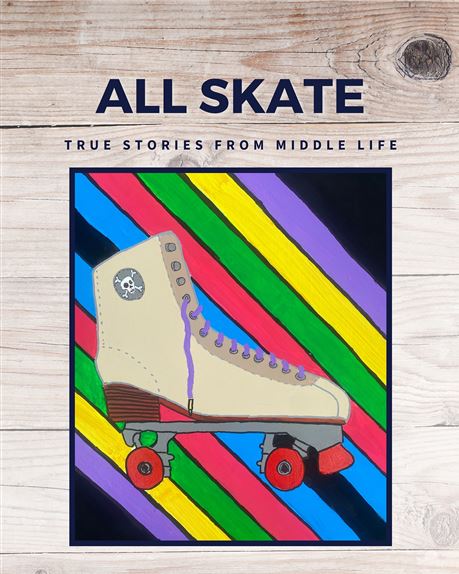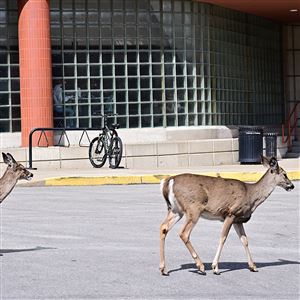Lori Jakiela’s latest essay collection, “All Skate: True Stories from Middle Life,” evokes a line from poet Linda Pastan’s “Something About the Trees”: “There is an age when you are most yourself.”
And though Jakiela, the Trafford writer and Pitt-Greensburg professor, found her writing voice many moons ago, perhaps it’s Pastan’s next line, “I know more than I did once,” that sums up the energy and drive of Jakiela’s latest, which is fittingly subtitled, “a dive into reflections wrought by a half-century of living.”
The essays in “All Skate” cover the expected midlife trajectory — loss of parents, empty-nest syndrome, the nature of work, body issues — sometimes in the same piece. But fans of Jakiela know that it’ll land with her unique blend of insight and honesty tinged with humor.
When she summons a line of Kurt Vonnegut’s, “be kind babies,” what’s most important is what she writes after, “I always thought he meant be kind to others, but maybe kindness starts with the self.” In a time where civility and understanding can be in short supply, maybe Jakiela is on to something.
In “Le Petite Butt,” she uses a department store dressing room to not only muse on American obsessions with body shape but manages to widen the scope into something more existential. “Today, I especially do not feel lucky in 20th-century America, in a T.J. Maxx dressing room, under bug-zapping fluorescent lights, in a mirror that reflects what I’ve come to think of as my own mortality.”
It takes talent to braid so much into these pages as she leaps from her French-friend Constance to Walt Whitman to gambling to her mother’s bikini to Plato and Sylvester Graham to travel in Paris. It’s also smart and observational in the way one of her many literary heroes, Ernest Hemingway, might’ve captured: “the fleeting loveliness of what it means to be alive, maybe.”
In “Pick Yourself Up Off the Ground,” readers are transported back to the pandemic and the boredom that finds the speaker “on a tennis court, trying not to pass out,” as she has, in her mother’s words, “the common sense of a doorknob.”
A roller skating adventure with her daughter has gone awry and she’s down with a broken wrist. But what’s more engaging is the idea of wanting to claw back some of those moments of carefree youth, even if it’s fraught with the peril of gravity. But as any daredevil worth their salt knows, the title is apt, and soon enough, we’re at the Eden Park Roller Rink in McKeesport, where, with the encouragement of teenage daughter Phelan, Jakiela is back at it. “My knees wobble but soon I’m flying, dodging downed kids, a human pinball zigging this way and that. When we take a break, Phelan says, ‘I saw you! You looked young, like another version of yourself.’”
“Enlightenment in Blue” moves toward another sweet spot for Jakiela: the working life. Beginning with the Zoom classes many taught during those dark days of 2020, she considers the technology and loss of personal connection left her “poisoned.”
She quickly pivots to her years of being a flight attendant, where “turbulence was always something. Everything unexpected, everything uncontrolled. Flight seems magical, out-of-body ordinary until it’s not.” That she ends up being thrown five rows after multiple lightning strikes is scary.
When she considers the pains that still lingers from those years, she thinks of them as “a postcard, the way I think of scars as postcards, my body stamped with time and place and memory — I was here and here and here. Physicality as presence. Physicality as meaning. Proof of life, maybe.”
But there is little that is a “maybe” in “All Skate,” as Jakiela’s writing calls to mind the words of another of her writerly heroes, Harry Crews, who once said, “Let’s get down to where the blood is, the bone is.”
Fred Shaw is a visiting lecturer in creative writing at the University of Pittsburgh.
First Published: April 13, 2025, 8:30 a.m.















